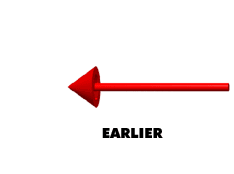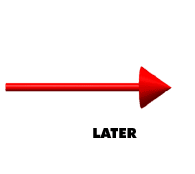| |
|
|
Dr. Balis:
|
|
Good morning, Mr. Mainor. Please take a seat.
|
|
|
|
|
Mr. Mainor:
|
|
Thank you, Doctor. Well, it has been an interesting week.
|
|
|
|
|
Dr. Balis:
|
|
How so?
|
|
|
|
|
Mr. Mainor:
|
|
Well, I guess writing a journal and trying to
get what's bothering you into words is really a valuable project. I was
skeptical, I have to admit. But I've realized that I'm an incredibly
shallow person who has a bunch of petty concerns. I keep thinking about
how I wanted to be famous and I wanted to be a writer and that's all gone
now. But the truth is that I wanted to be a writer for all the wrong reasons.
I just wanted the fame and that sense that I could sit in coffee houses
holding a pipe, or something. I could be the image of a writer. I wasn't
much interested in the actual writing part. And now I'm moaning about how
I'm not going to win the Pulitzer. I wrote my journal this week and
reading it again makes me feel almost slimy or something. I really am
a whiner, aren't I?
|
|
|
|
|
Dr. Balis:
|
|
It sounds like you're being hard on yourself.
|
|
|
|
|
Mr. Mainor:
|
|
It's just so stupid. Moaning, "I'm a fail.......ure."
Tough shit, right? Life doesn't reward moaners, only doers. And I'm clearly
a moaner.
|
|
|
|
|
Dr. Balis:
|
|
Why don't we talk about how you came to this conclusion?
|
|
|
|
|
Mr. Mainor:
|
|
Actually, I have you to thank, Doc. Thanks a lot!
|
|
|
|
|
Dr. Balis:
|
|
I sense a bit of sarcasm.
|
|
|
|
|
Mr. Mainor:
|
|
Well, putting it into words really forces the truth to
come out. It's one thing to be vaguely dissatisfied, and it's another to
figure out the reason is that I don't fit an image of myself that I had.
In my head, I was always a real writer forced to do menial work that
was beneath me. Now I have to come to terms with the idea that I am doing
what I am qualified to do.
|
|
|
|
|
Dr. Balis:
|
|
Hmmm.
|
|
|
|
|
Mr. Mainor:
|
|
Actually, I wish you'd talk me out of it.
|
|
|
|
|
Dr. Balis:
|
|
I'm sorry?
|
|
|
|
|
Mr. Mainor:
|
|
Tell me that I'm really brilliant and that this is just a
passing fancy.
|
|
|
|
|
Dr. Balis:
|
|
You're looking for reassurance?
|
|
|
|
|
Mr. Mainor:
|
|
I guess so. I hate how my whining sounds. But I'm
not ready to give up the comforting illusion that I really am a writer.
I know that I'm not and yet it is so much a part of how I think of myself
and of who I think I am that to just toss it seems like...I don't know.
Like a part of me is dying, or something. Not that dramatic, but you know
what I mean.
|
|
|
|
|
Dr. Balis:
|
|
You mentioned last week that your writing has been published.
|
|
|
|
|
Mr. Mainor:
|
|
Past glories.
|
|
|
|
|
Dr. Balis:
|
|
When you read your old work, do you think you were a good
writer?
|
|
|
|
|
Mr. Mainor:
|
|
You assume I still read that stuff? Actually, I read
it all about once a month, I'm ashamed to admit. Yeah, I think it was really
good.
|
|
|
|
|
Dr. Balis:
|
|
So the person who wrote that was a good writer, correct?
|
|
|
|
|
Mr. Mainor:
|
|
Yeah, he was good. But he isn't me anymore. I don't think
I can do it anymore.
|
|
|
|
|
Dr. Balis:
|
|
Have you tried?
|
|
|
|
|
Mr. Mainor:
|
|
Sure I've tried. What do you mean?
|
|
|
|
|
Dr. Balis:
|
|
Do you sit down and write anymore?
|
|
|
|
|
Mr. Mainor:
|
|
Well, I've stared at a blank piece of paper for my share
of time. Actually a blank screen. That's almost like writing. I don't think
I can do it anymore. The old stuff was done in a flash of inspiration, and
I don't get those anymore.
|
|
|
|
|
Dr. Balis:
|
|
What is it that's stopping you?
|
|
|
|
|
Mr. Mainor:
|
|
The stuff just isn't good anymore.
|
|
|
|
|
Dr. Balis:
|
|
So every time you start to write, you are comparing
what you write to what you used to write?
|
|
|
|
|
Mr. Mainor:
|
|
I guess.
|
|
|
|
|
Dr. Balis:
|
|
And it just doesn't measure up to those words which you've
now read weekly for ten to twelve years?
|
|
|
|
|
Mr. Mainor:
|
|
What are you getting at?
|
|
|
|
|
Dr. Balis:
|
|
It seems like you may be letting your inner critic
stifle your work. If every word you write is scrutinized immediately
after you write it by comparing it to work that you think is really good,
you'll never be able to write. Tolstoy couldn't write under those conditions.
|
|
|
|
|
Mr. Mainor:
|
|
I see your point. But how do I turn off this inner critic?
|
|
|
|
|
Dr. Balis:
|
|
I'm not a writer, but we can work at it. I see a lot
of people who are too self critical. Usually, they need to gain some self-esteem.
Often, I find that there was someone who was extremely critical in their
past, and now they have substituted their inner voice for that other person's
outer voice.
|
|
|
|
|
Mr. Mainor:
|
|
Actually, neither of my parents were what you'd call
supportive.
|
|
|
|
|
Dr. Balis:
|
|
I think the best answer for you is to try to write something
that has nothing to do with the types of fiction you used to write. You
wrote Westerns, how about trying science fiction, or romance. Try writing
in a new genre. It will be harder to compare it to your previous stuff.
And I would try automatic writing--just let it flow, there's plenty of time
to edit it later. Don't even read what you've already written. Just write
and continue to write until you have a first draft. You can then go back
and cut out all the stuff you hate.
|
|
|
|
|
Mr. Mainor:
|
|
Sounds easier said than done.
|
|
|
|
|
Dr. Balis:
|
|
That's true. It will be a challenge. But I think you're
up for it.
|
|
|
|
|
Mr. Mainor:
|
|
Look, I'll give it a try. I guess if I'm going to think
of myself as a writer, I'm really going to have to write something.
|
|
|
|
|
Dr. Balis:
|
|
I think that's true. You said your parents weren't supportive.
Were they critical?
|
|
|
|
|
Mr. Mainor:
|
|
Well, you could say that. They used to make fun of
me when I tried to do something that I wasn't good at.
|
|
|
|
|
Dr. Balis:
|
|
Can you think of an example?
|
|
|
|
|
Mr. Mainor:
|
|
Well, let's see. I remember that I picked up the violin
when I was a kid. I couldn't play it all and I had no ear, so I'm sure it
was hard to listen to me practice. But all my parents did was make fun of
me. It wasn't like they sat there and pointed and laughed. They weren't
trying to be cruel. But they kept talking about a young Heifetz and how
I was almost ready to play at Carnegie Hall, when I was trying to scratch
out Twinkle Twinkle Little Star. It was clear they thought I was awful,
and I was, of course. But it still hurt.
|
|
|
|
|
Dr. Balis:
|
|
Can you remember other times when your parents were critical?
|
|
|
|
|
Mr. Mainor:
|
|
Sure, we can do this all day. If I brought home an
A minus, my parents would be disappointed. They would say, "A minus!
A minus? My son's a minus?" Thinking back, they must have thought
it was funny. But it stung back then.
|
|
|
|
|
Dr. Balis:
|
|
Maybe a little, still?
|
|
|
|
|
Mr. Mainor:
|
|
Maybe a little.
|
|
|
|
|
Dr. Balis:
|
|
Were they critical about what you wrote, those published stories?
|
|
|
|
|
Mr. Mainor:
|
|
Actually, I think they were proud of me. I really think
they were impressed that I got published. My mother took me aside and got
real serious and said that she thought they were really good. My father
was all "Well, it's not the kind of literature I normally read, but
I think they were really good examples of the genre..." It's one
time I can remember that they really liked something I did.
|
|
|
|
|
Dr. Balis:
|
|
I think our time is up for this session. I'd really like
to have you continue writing your journal, and I hope that you'll try to
write without editing your work as you write.
|
|
|
|
|
Mr. Mainor:
|
|
I'm excited to give it a try. I'll see you next week.
|
|
|
|
|
Dr. Balis:
|
|
Good. Next Monday at 10, okay.
|
|
|
|
|
Mr. Mainor:
|
|
I'll be here. Thanks, Doc.
|
|
|
|
|
|
|
###
|
|










